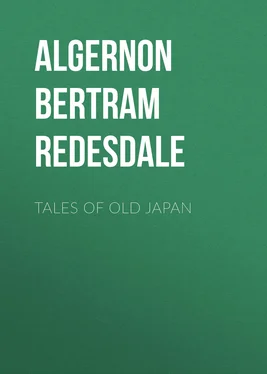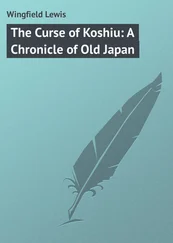Algernon Bertram Freeman-Mitford Redesdale - Tales of Old Japan
Здесь есть возможность читать онлайн «Algernon Bertram Freeman-Mitford Redesdale - Tales of Old Japan» — ознакомительный отрывок электронной книги совершенно бесплатно, а после прочтения отрывка купить полную версию. В некоторых случаях можно слушать аудио, скачать через торрент в формате fb2 и присутствует краткое содержание. Жанр: Сказка, Старинная литература, foreign_antique, foreign_prose, на английском языке. Описание произведения, (предисловие) а так же отзывы посетителей доступны на портале библиотеки ЛибКат.
- Название:Tales of Old Japan
- Автор:
- Жанр:
- Год:неизвестен
- ISBN:нет данных
- Рейтинг книги:4 / 5. Голосов: 1
-
Избранное:Добавить в избранное
- Отзывы:
-
Ваша оценка:
- 80
- 1
- 2
- 3
- 4
- 5
Tales of Old Japan: краткое содержание, описание и аннотация
Предлагаем к чтению аннотацию, описание, краткое содержание или предисловие (зависит от того, что написал сам автор книги «Tales of Old Japan»). Если вы не нашли необходимую информацию о книге — напишите в комментариях, мы постараемся отыскать её.
Tales of Old Japan — читать онлайн ознакомительный отрывок
Ниже представлен текст книги, разбитый по страницам. Система сохранения места последней прочитанной страницы, позволяет с удобством читать онлайн бесплатно книгу «Tales of Old Japan», без необходимости каждый раз заново искать на чём Вы остановились. Поставьте закладку, и сможете в любой момент перейти на страницу, на которой закончили чтение.
Интервал:
Закладка:
Baron Algernon Bertram Freeman-Mitford Redesdale
Tales of Old Japan
PREFACE
In the Introduction to the story of the Forty-seven Rônins, I have said almost as much as is needful by way of preface to my stories.
Those of my readers who are most capable of pointing out the many shortcomings and faults of my work, will also be the most indulgent towards me; for any one who has been in Japan, and studied Japanese, knows the great difficulties by which the learner is beset.
For the illustrations, at least, I feel that I need make no apology. Drawn, in the first instance, by one Ôdaké, an artist in my employ, they were cut on wood by a famous wood-engraver at Yedo, and are therefore genuine specimens of Japanese art. Messrs. Dalziel, on examining the wood blocks, pointed out to me, as an interesting fact, that the lines are cut with the grain of the wood, after the manner of Albert Dürer and some of the old German masters,—a process which has been abandoned by modern European wood-engravers.
It will be noticed that very little allusion is made in these Tales to the Emperor and his Court. Although I searched diligently, I was able to find no story in which they played a conspicuous part.
Another class to which no allusion is made is that of the Gôshi. The Gôshi are a kind of yeomen, or bonnet-lairds, as they would be called over the border, living on their own land, and owning no allegiance to any feudal lord. Their rank is inferior to that of the Samurai, or men of the military class, between whom and the peasantry they hold a middle place. Like the Samurai, they wear two swords, and are in many cases prosperous and wealthy men claiming a descent more ancient than that of many of the feudal Princes. A large number of them are enrolled among the Emperor's body-guard; and these have played a conspicuous part in the recent political changes in Japan, as the most conservative and anti-foreign element in the nation.
With these exceptions, I think that all classes are fairly represented in my stories.
The feudal system has passed away like a dissolving view before the eyes of those who have lived in Japan during the last few years. But when they arrived there it was in full force, and there is not an incident narrated in the following pages, however strange it may appear to Europeans, for the possibility and probability of which those most competent to judge will not vouch. Nor, as many a recent event can prove, have heroism, chivalry, and devotion gone out of the land altogether. We may deplore and inveigh against the Yamato Damashi, or Spirit of Old Japan, which still breathes in the soul of the Samurai, but we cannot withhold our admiration from the self-sacrifices which men will still make for the love of their country.
The first two of the Tales have already appeared in the Fortnightly Review, and two of the Sermons, with a portion of the Appendix on the subject of the Hara-Kiri, in the pages of the Cornhill Magazine . I have to thank the editors of those periodicals for permission to reprint them here.
LONDON, January 7, 1871.
TALES OF OLD JAPAN
THE FORTY-SEVEN RÔNINS
The books which have been written of late years about Japan have either been compiled from official records, or have contained the sketchy impressions of passing travellers. Of the inner life of the Japanese the world at large knows but little: their religion, their superstitions, their ways of thought, the hidden springs by which they move—all these are as yet mysteries. Nor is this to be wondered at. The first Western men who came in contact with Japan—I am speaking not of the old Dutch and Portuguese traders and priests, but of the diplomatists and merchants of eleven years ago—met with a cold reception. Above all things, the native Government threw obstacles in the way of any inquiry into their language, literature, and history. The fact was that the Tycoon's Government—with whom alone, so long as the Mikado remained in seclusion in his sacred capital at Kiôto, any relations were maintained—knew that the Imperial purple with which they sought to invest their chief must quickly fade before the strong sunlight which would be brought upon it so soon as there should be European linguists capable of examining their books and records. No opportunity was lost of throwing dust in the eyes of the new-comers, whom, even in the most trifling details, it was the official policy to lead astray. Now, however, there is no cause for concealment; the Roi Fainéant has shaken off his sloth, and his Maire du Palais , together, and an intelligible Government, which need not fear scrutiny from abroad, is the result: the records of the country being but so many proofs of the Mikado's title to power, there is no reason for keeping up any show of mystery. The path of inquiry is open to all; and although there is yet much to be learnt, some knowledge has been attained, in which it may interest those who stay at home to share.
The recent revolution in Japan has wrought changes social as well as political; and it may be that when, in addition to the advance which has already been made, railways and telegraphs shall have connected the principal points of the Land of Sunrise, the old Japanese, such as he was and had been for centuries when we found him eleven short years ago, will have become extinct. It has appeared to me that no better means could be chosen of preserving a record of a curious and fast disappearing civilization than the translation of some of the most interesting national legends and histories, together with other specimens of literature bearing upon the same subject. Thus the Japanese may tell their own tale, their translator only adding here and there a few words of heading or tag to a chapter, where an explanation or amplification may seem necessary. I fear that the long and hard names will often make my tales tedious reading, but I believe that those who will bear with the difficulty will learn more of the character of the Japanese people than by skimming over descriptions of travel and adventure, however brilliant. The lord and his retainer, the warrior and the priest, the humble artisan and the despised Eta or pariah, each in his turn will become a leading character in my budget of stories; and it is out of the mouths of these personages that I hope to show forth a tolerably complete picture of Japanese society.
Having said so much by way of preface, I beg my readers to fancy themselves wafted away to the shores of the Bay of Yedo—a fair, smiling landscape: gentle slopes, crested by a dark fringe of pines and firs, lead down to the sea; the quaint eaves of many a temple and holy shrine peep out here and there from the groves; the bay itself is studded with picturesque fisher-craft, the torches of which shine by night like glow-worms among the outlying forts; far away to the west loom the goblin-haunted heights of Oyama, and beyond the twin hills of the Hakoné Pass—Fuji-Yama, the Peerless Mountain, solitary and grand, stands in the centre of the plain, from which it sprang vomiting flames twenty-one centuries ago. 1 1 According to Japanese tradition, in the fifth year of the Emperor Kôrei (286 B.C.), the earth opened in the province of Omi, near Kiôto, and Lake Biwa, sixty miles long by about eighteen broad, was formed in the shape of a Biwa , or four-stringed lute, from which it takes its name. At the same time, to compensate for the depression of the earth, but at a distance of over three hundred miles from the lake, rose Fuji-Yama, the last eruption of which was in the year 1707. The last great earthquake at Yedo took place about fifteen years ago. Twenty thousand souls are said to have perished in it, and the dead were carried away and buried by cartloads; many persons, trying to escape from their falling and burning houses, were caught in great clefts, which yawned suddenly in the earth, and as suddenly closed upon the victims, crushing them to death. For several days heavy shocks continued to be felt, and the people camped out, not daring to return to such houses as had been spared, nor to build up those which lay in ruins.
For a hundred and sixty years the huge mountain has been at peace, but the frequent earthquakes still tell of hidden fires, and none can say when the red-hot stones and ashes may once more fall like rain over five provinces.
Интервал:
Закладка:
Похожие книги на «Tales of Old Japan»
Представляем Вашему вниманию похожие книги на «Tales of Old Japan» списком для выбора. Мы отобрали схожую по названию и смыслу литературу в надежде предоставить читателям больше вариантов отыскать новые, интересные, ещё непрочитанные произведения.
Обсуждение, отзывы о книге «Tales of Old Japan» и просто собственные мнения читателей. Оставьте ваши комментарии, напишите, что Вы думаете о произведении, его смысле или главных героях. Укажите что конкретно понравилось, а что нет, и почему Вы так считаете.

![Майкл Суэнвик - Tales of Old Earth [A collection of short-stories]](/books/388351/majkl-suenvik-tales-of-old-earth-a-collection-of-short-stories-thumb.webp)










